Note
Hi, wingsoverlagos!
Love your blog from The Bruce McMouse Show' Paul to your posts on magic Lewisohn. Thank you a lot!
And not that it matters but I thought about you when read this comment on youtube (by @DrAnne-mc8er, who tells nice and seems truely stories about her family, especially on her unkle worked with The Beatles in 1969, and her own childhood near Paul, John, George and Ringo),
'… I've kept written diaries my whole life, which our youngest daughter is in the (necessarily) very long process of putting in date order with my help. These go way back to the early 50's, and include things which (now) seem so innocent and naive. Like when John knocked me off a swing in the local park, and when John and Paul had a real fight over a pair of £2 roller skates, both refusing to give up the one skate they each were holding on to for dear life! LOL Obviously this was when we were all still teenage kids fooling around.
Yes, I was contacted by a lady well over a year ago from "the office of" Mr Lewisohn in London, which to be quite honest, I thought was an arrogant way of him going about things, and I said so to the lady. Anyway he called back to "personally apologise". I should probably clarify that I'm now well into my seventies, and have a number of health issues. Yet rather than come up and see me at home in Liverpool, Mr Lewisohn assumed that I would be so keen to be in his book, that I would take the 3 hour train journey, to go and see him (or an assistant) in London, stay overnight if necessary, and then "hope" that anything I would say about the early days, might make it into his planned book. ALL at my own personal expense!
Needless to say I told my husband what Mr Lewisohn expected, and I also phoned Paul to tell him (in no uncertain terms) what I thought of the man. Frustratingly, our daughter who's here now, has just said I can't say what Paul said to me over the phone, here in a public forum. So that's as much as I can say. Well, other than I chose NOT to take the delightful Mr Lewisohn up on his offer! (I'm angry with him now all over again, just recalling what the arrogant sod expected me to do!) But anyway greenatom, you now know the story behind all that.
PS - Our daughter's gone home, so I'll quickly tell you that Paul said he'd talk to Richie (Ringo) about everything, and would phone me back. Anyway in the meantime, Barb phoned me and said Richie was furious with this Mark Lewisohn about what had happened, and that he should "stick his effing book where the sun don't shine!" LOL Then Paul phoned me back the same evening, and said he'd been round to Richie and Barb's (which of course I knew after chatting with Barb earlier), and said it was entirely up to me. but that he and Richie, both felt that I should tell Mark Lewisohn to "eff off". So I don't know for certain, but I think Paul and Richie might have temporarily fallen out a bit with Mr Lewisohn. Not just because of how he spoke to me, but mainly because as Paul said over the phone, the book is supposed to be about The Beatles. Not what the lads got up to as kids individually. Sorry for writing such a stupidly long reply, but take care anyway, and please stay healthy and wear a mask x'
From https://www.youtube.com/watch?v=3hv2EkzqUb8&lc=Ugy-Dnq03NdsYhh6xTB4AaABAg&ab_channel=YouCan%27tUnhearThis
Thank you so much for reading my posts, and for sending this message along! The comment thread in question is very interesting and sent me down quite the rabbithole. I wanted to believe! But I fear this person's story doesn't line up on close inspection.
The thread in question is at the top of the comment section on this video on the You Can't Unhear This Youtube channel. It's from the user "DrAnne-mc8er" who claims to be the neice of Bob Moog, of synthesizer fame. The thread is over 100 comments long with many replies by Dr. Anne. In addition to being the neice of Bob Moog, she claims to have known Paul and George as kids, being a couple of years younger than them, and to still be friends with them to this day. She says she has many handwritten journals starting in the 1950s and, most pertinently, she claims to have been contacted by the office of Mark Lewisohn. Her story goes that a research assistant of Lewisohn contacted her; Dr. Anne thought it was rudely done, and Lewisohn then conteacted her personally to apologize. She came away with the impression that he was full of himself, and then spoke to Paul & Ringo, who confirmed that Lewisohn was bad news.
Obviously, this story was like catnip to me. Having beef with Mark Lewisohn is such a specific thing to lie about, I thought, would anyone bother to add this detail if they were simply LARPing as someone celeb-adjacent? Still, there were some details that gave me pause. Dr. Anne said, for instance, that John was a devout christian at the time of the Maureen Cleave interview, which...lol. But one very wrong assumption doesn't necessarily invalidate her entire story. She also said that George Harrison had done uncredited backing vocals on London Town, which sounds improbable, but idk, you never know???
So I decided to dig in to see if anything she said held water. First, I image searched her profile picture (crazy how using a basic google function makes me feel like Sherlock Holmes), and the results were somewhat encouraging: the picture was indeed of a Dr. Anne Cremona, a psychologist. Further digging showed that the real Dr. Anne and the commenter Dr. Anne both professed to have at least four children. On the flip side, Commenter Dr. Anne purports to live in Liverpool, while Actual Dr. Anne practices in London. Not a realistic commute, eh?
But the story truly fell apart once I looked into Bob Moog, who I previously knew nothing about aside from the fact that he was the Synthesizer Guy. Commenter Dr. Anne said that her mother was Bob Moog's younger sister, who had moved to the UK in 1938. She named her grandfather as Robert Sr. There are claims with all of these problems, not the least of which is the fact that Bob Moog seems to have been an only child. I read the first few chapters of a biography of Moog--(Switched On by Albert Glinsky)--which provides plenty of detail on Moog's family going several generations back, but doesn't mention any siblings.
The second issue is the timing: based on this commenter's story, she would have been born around 1944 or 1945. Bob Moog was born in 1934. If he somehow had a younger sister who went unmentioned in his biography, she would have been at most three years old in 1938, when she purportedly went to Liverpool--with a non-parent guardian, as Bob Moog lived with both his parents. This sister would have been ten at the oldest when "Dr. Anne" claims to have been born.
Then we have her grandfather, Robert Sr. Bob Moog was actually the first Robert in a long line of Georges. His dad was George, his grandfather was George, and his great-grandfather was, I think, Georg. There may have been another George thrown in there.
So it seems like this commenter is just doing some high effort LARPing. The thing I'm left wondering is whether or not this commenter is actually Dr. Anne Cremona. If it isn't, they didn't just pick a random picture for their troll account, but used her name as well, all while incorporating details that seem pulled from her life. There's the number of children for one, but the commenter also sprinkles in some psychology talk.
What's the deal? Is this an actual psychologist doing some dedicated trolling (the comment chain spanned a time period of more than a year) with her actual name and picture? Or is this a troll impersonating an actual psychologist as part of their neice-of-Bob-Moog routine?
Thank you for sending this my way, @tavolgisvist! It may not be the genuine article, but I had a lot of fun digging into it. The Mark Lewisohn Tipline (my askbox) is always open!
#the added detail that dr. anne cremona formed a special interest group#for women in the uk in the field of psychology#guess what field ml's wife works in...#coincidence? almost certainly
11 notes
·
View notes
Photo

Wings; Paul McCartney, Linda McCartney, Jimmy McCulloch, Denny Laine and Geoff Britton. 1974. Photo taken by Michael Putland.
371 notes
·
View notes
Text
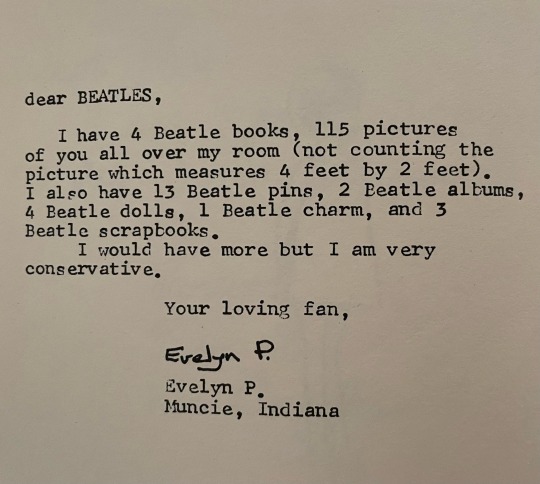


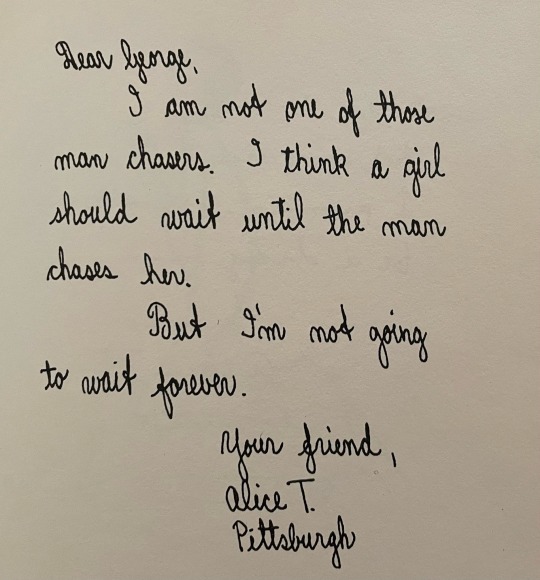

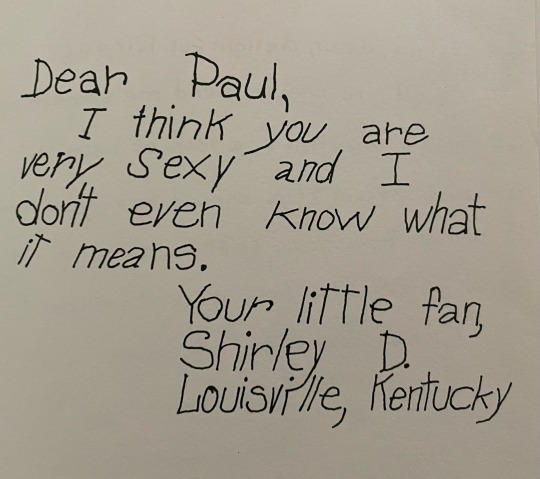



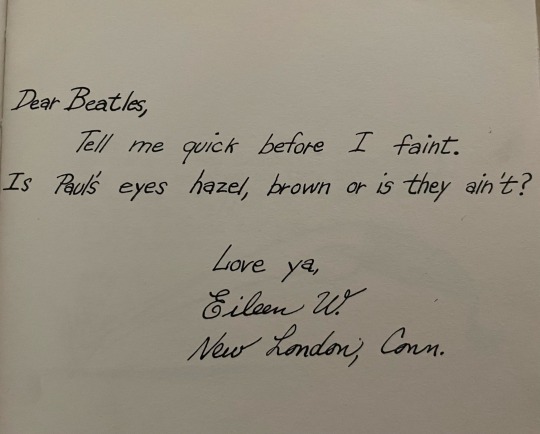
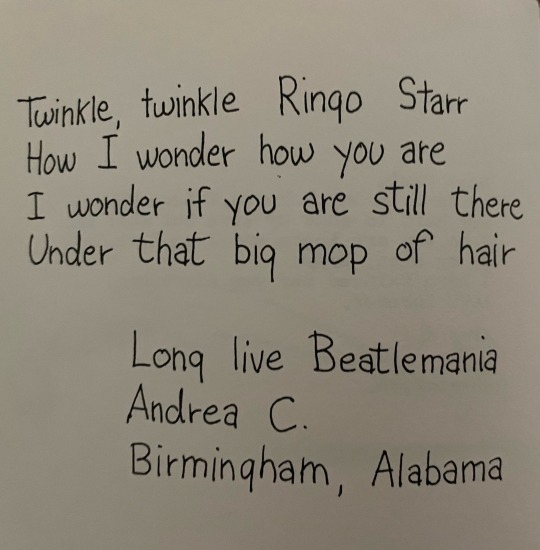
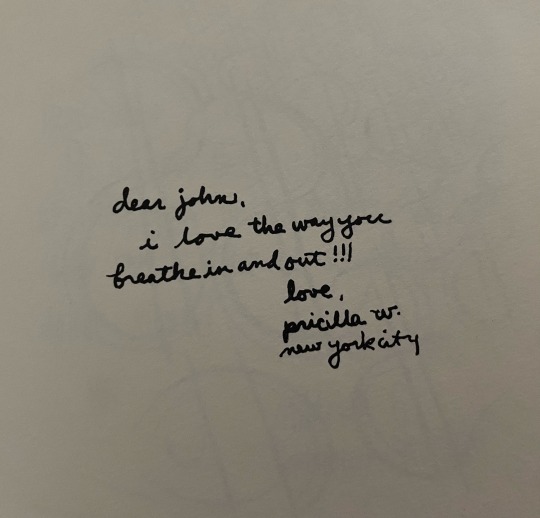
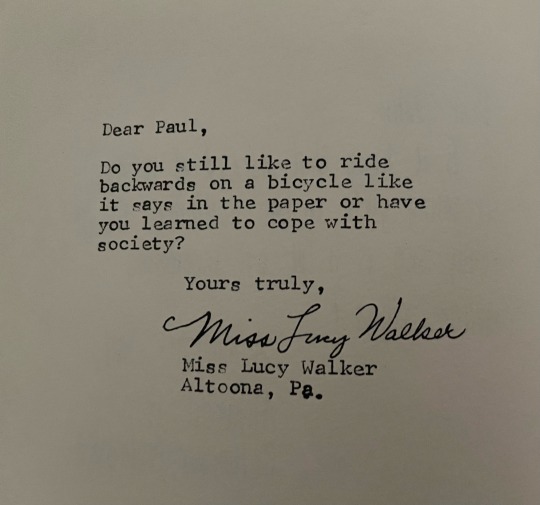
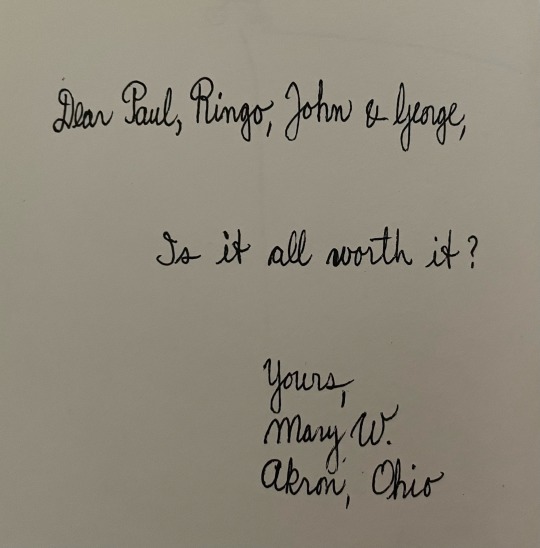

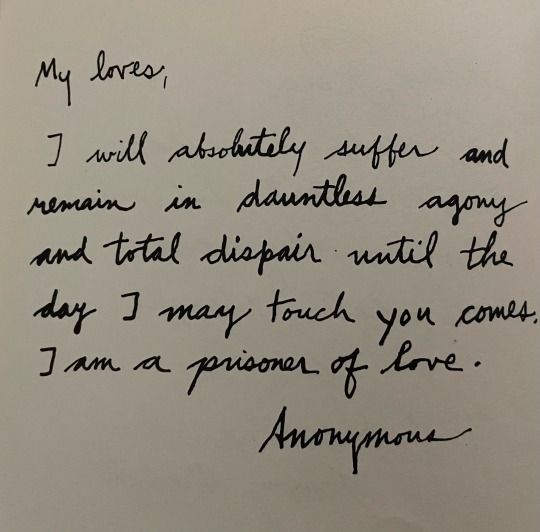
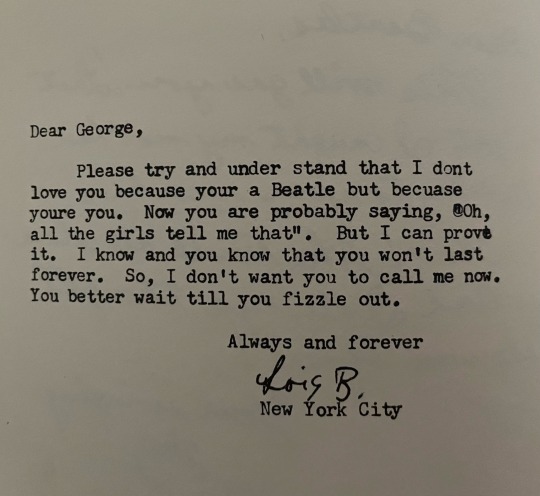

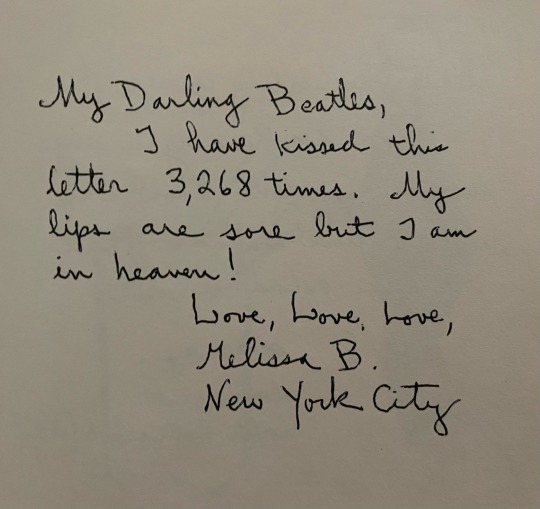
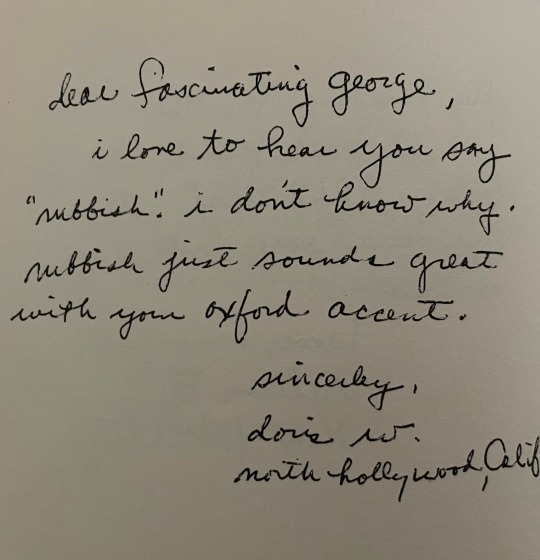

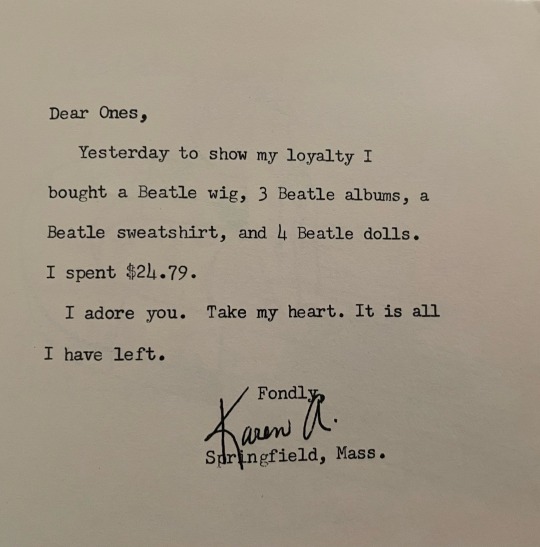

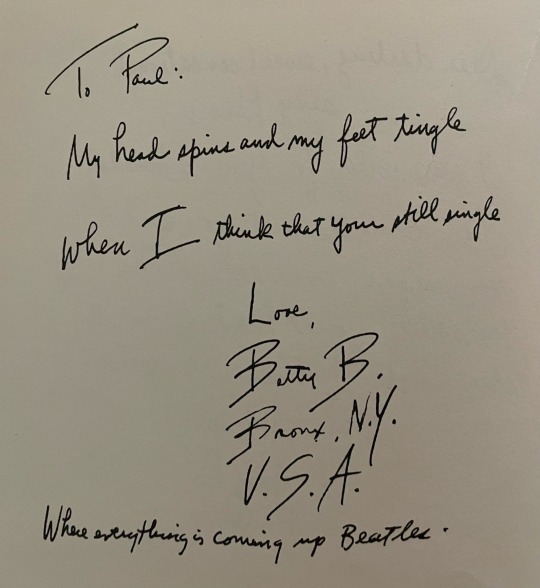

some of the letters quoted in Love Letters to the Beatles (selected by Bill Adler), 1964
779 notes
·
View notes
Text
Lewisohn's Little Mysteries
I should be posting the next piece dissecting the Mark Lewisohn/Kim Bennett/Parlophone contract saga--it's in the works, I promise! @mythserene and I are typing and scheming and typing some more--but most of my time has been put towards checking a zillion citations, and I wanted to share a little something before my next proper piece. The zillion-checked-citations will hopefully be available in some form soon; enjoy this as a snack to hold you over 'til dinner.
As we know, Mark Lewisohn likes to bust a myth, tear down our preconceived notions, and shed light into the murky corners of Beatles history (source: Mark Lewisohn.) But there's another pattern I've noticed while checking his citations: he likes to inject a little ambiguity every now and then where perfect clarity is possible.
I've run across a few cases of this--I'll try to dig those out and add them later--but I was struck by this example from The Best of Fellas (2002), Spencer Leigh's biography of Bob Wooler. Lewisohn sets up a little mystery, writes that there's something we simply don't know--all the while, the source is perfectly clear.
Tune In 18-46 vs. Leigh 2002 p.147
This section discusses the Beatles' plans to not pay Allan Williams a percentage for their second string of gigs in Hamburg. From Tune In:

Paul tells Bob Wooler they won't be paying Allan Williams commission; Paul adds that he suspects Wooler will tell Williams, as the two are friends. Wooler agrees--yep, he's going to tell Williams. Then Lewisohn introduces his petite paranthetical mystery: "(It isn't clear if or when Wooler did, however.)"
Now, from The Best of Fellas (this, like much of the book, is told through a quote by Bob Wooler himself):
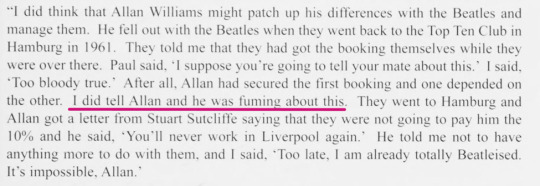
To quote Wooler, "I did tell Allan and he was fuming about this." If you're struggling with the subtlety and intricacy of this quote (hi, Mark!), I'll reiterate the key phrase: "I did tell Allan." Sure, he doesn't give an exact date or anything, but from the general context, we can assume it occurred around the same time.
Why? Why does he do this? He had to actively write out that it "wasn't clear" if Bob told Allan about the Beatles' financial scheme. It would have been simpler (and more correct) to not write that. This is very strange behavior! Though I have a better understanding of Lewisohn than when I started, I still don't get why he does things like this--why introduce this ambiguity to the record when the answer is in your source, in the very same paragraph?
Also strange: that bracketed "to me" at the start of the quote. “Paul said [to me], ‘I suppose you’re going to tell your mate…’” Using brackets to clarify ambiguity in a quote is fine, but where is the ambiguity here? If someone says, “Paul said, ‘You’re going to…’” it is understood that Paul is talking to the speaker. Lewisohn even says, in the sentence before the quote, “Bob Wooler later related how Paul told him that…” There isn’t a shred of ambiguity here. Don’t amend a quote if you don’t have to! Let the words speak for themselves!
Sources:
Leigh S. 2002. The Best Of Fellas: The Story of Bob Wooler, Liverpool’s First D.J. Liverpool: Drivegreen Publications Ltd. 264p. Accessed online 2024 Apr 23. Available from: https://archive.org/details/bestoffellasstor0000leig/mode/2up
Lewisohn M. 2013. The Beatles: All These Years Vol. 1: Tune In. New York (NY): Crown Archetype. [ebook]
15 notes
·
View notes
Text

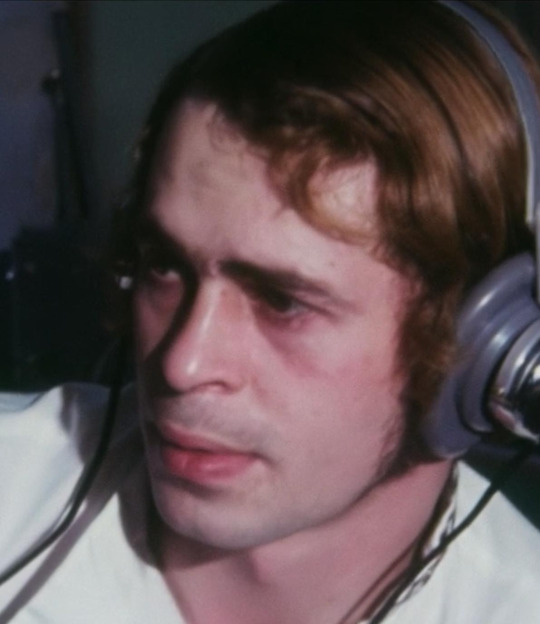
I love how stressed he looks in these screencaps. diva.....you weren't doing anything that warranted that 😭
38 notes
·
View notes
Text
I think Alex wanted to be a very loyal friend to John. He wanted John's attention. There were enough men that wanted his attention at that time. It wasn't physical, it was mental. They were almost desperate, the heterosexual ones.
Pattie Boyd on "Magic" Alex Mardas and John Lennon, interviewed in 1980. Peter Brown and Steven Gaines, All You Need Is Love (2024)
59 notes
·
View notes
Text
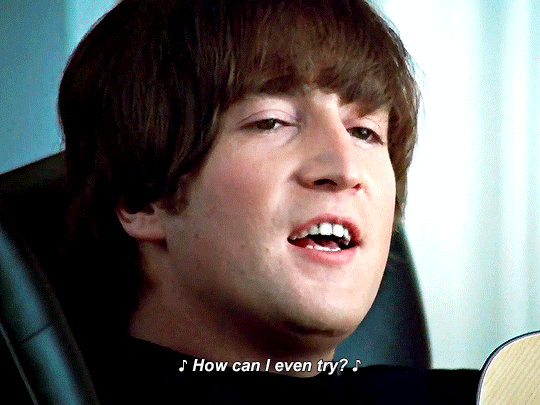

John Lennon singing You've Got To Hide Your Love Away (1965)
209 notes
·
View notes
Text
can’t reblog with a video but @pauls1967moustache’s post made me think about paul talking about how he loves to smell paper during the wide prairie promotional livestream 😭
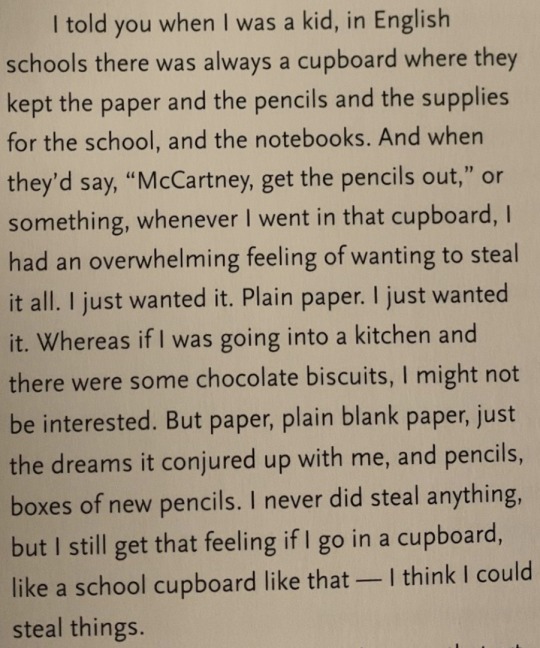
134 notes
·
View notes
Photo
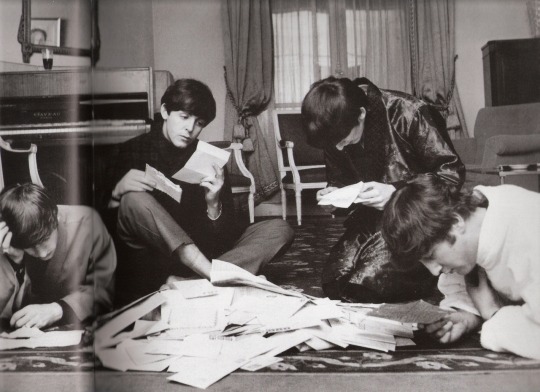
Scan - reading fan mail, Paris, January 1964
Photo: Harry Benson
“When I was with the Beatles in Paris, I found it interesting that Ringo received the greatest volume of fan mail, followed in diminishing order by George and then John, with Paul a distant fourth.” - Harry Benson
1K notes
·
View notes
Text
john lennon getting married in 1969 be like

710 notes
·
View notes
Text
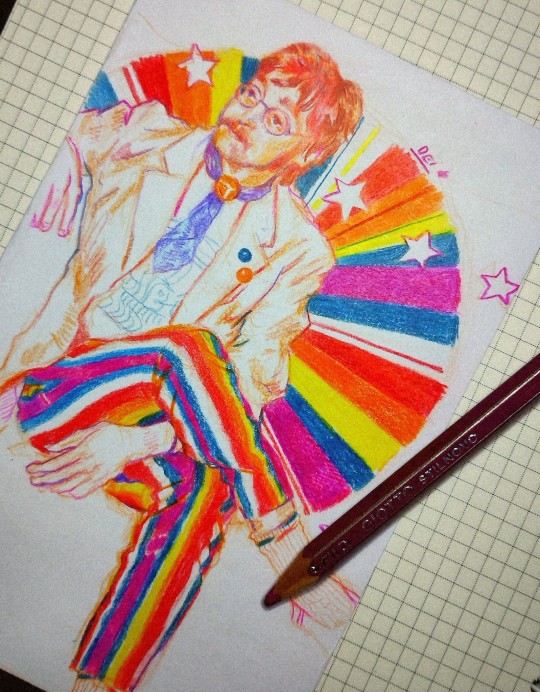
God i'm in love with those stripes🍏🌈😭 I should draw more John of that era🌚💕 I hope u like it!
243 notes
·
View notes
Text

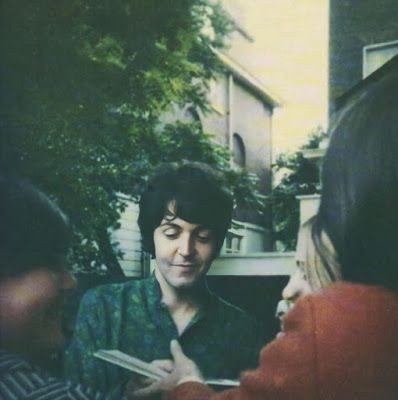




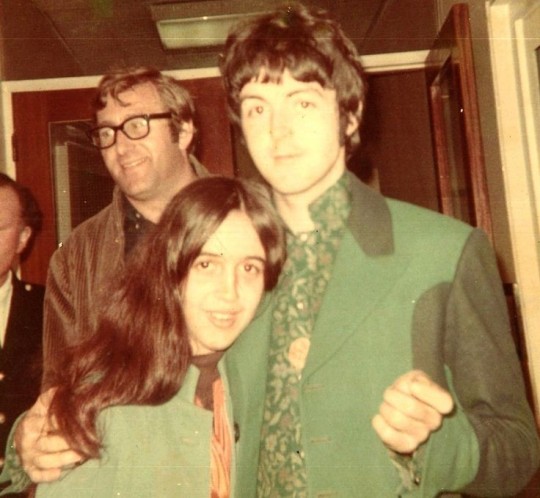
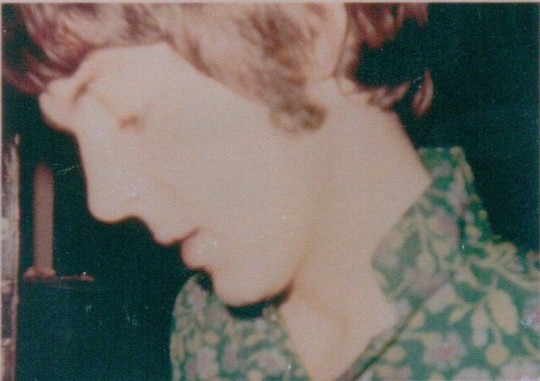
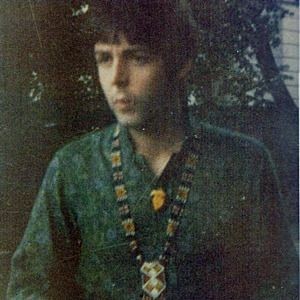
ohhh save me green shirt … save me …..
64 notes
·
View notes
Text
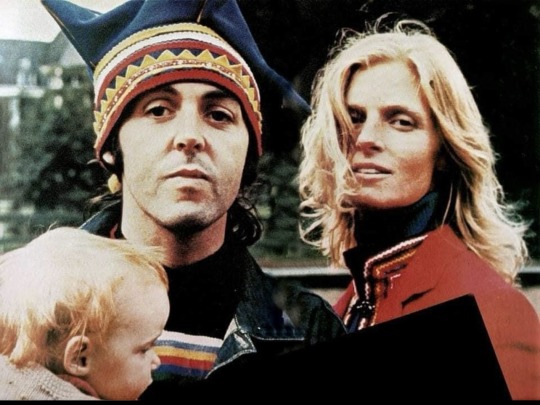
Paul, Linda & Stella 1972🌼🌼🌼
Via @lindalouiseeastmanmccartney on Instagram🌼
108 notes
·
View notes
Text
reblogging with corrections
Lewisohn vs. Peebles (Update/Correction)
I've been going back through my early work and found an issue with this post: in my original post, I incorrectly assumed that Lewisohn had made up the middle part of a quote. On re-examining the footnote, I found it was actually a FrankenQuote, with two sources cited in the footnote. It's still not an actual quote, but it's a lesser degree of academic dishonesty. The corrected version of the post follows:
Continuing my comparison of Mark Lewisohn’s Tune In against its sources, we come to Andy Peebles’ 1980 interview of John Lennon and Yoko Ono. The interview, conducted on December 6, 1980, was aired on the BBC Radio 1.
Lewisohn quotes this interview three times, and two of them are properly done (endnotes P-14 and 5-38). The final citation from the Peebles interview is a FrankenQuote, combining a quote from Peebles with
though, because Lewisohn thought John Lennon should go into greater detail on…Elvis’s balls.
Peebles 1981 p.73-74 vs Tune In 25-18


Yellow piece from Peebles, pink piece from interview by Jean-François Vallée (1975). I still haven't found the Vallée interview, so we will have to take Lewisohn at his word for now. I'm not sure why Lewisohn decided to combine these two quotes rather than cutting the full quote from Peebles - I guess the final FrankenQuote is more colorful?
For my previous posts on Lewisohn's citation problems, click here. Even more Lewisohn fact-checking goodness @mythserene's blog.
Source: Peebles A. 1981. The Lennon Tapes: John Lennon and Yoko Ono In Conversation With Andy Peebles, 6 December 1980. London: BBC Publications. 95p.
18 notes
·
View notes
Text
You might even say he's...delewisohnal 😎
LEWISOHN: the delusional dimension
“And the drama of him getting the passport was an extraordinary story that had never been told.”
Designing Lewisohn is the primary Lewisohn, but Delusional Lewisohn is definitely a thing.
@wingsoverlagos and I listen to a lot of Lewisohn podcast interviews and when she first shared this one with me I was only half paying attention, but when I played it again last week on one of my walks it came all the way home and helped me make sense of a chunk of text I’ve been bogged down in for weeks. Like most of Lewisohn’s fictionalizing, the narrative I’ve been untangling is almost all calculation, but there are also sprinkles of full-on Lewisohn Fanfic thrown in, and this clip turned out to be my Delusional Lewisohn Rosetta Stone.
DELUSIONAL LEWISOHN “unearths” a heck of a story (by noting the dates on two documents)
On “Things We Said Today” in 2017, Delusional Lewisohn explained how he “unearthed” the never-before told story of Mimi hiding John’s birth certificate before the 1960 Hamburg trip. The confidence with which he recounts a series of events that only shows beyond all doubt that “the extraordinary story” he’s about to convey was not “unearthed,” but concocted—or dreamed—while clearly expecting the listener to see exactly how it fits together and proves his narrative seems inexplicable to me by anything but delusion. Or if there is a rational explanation, it lies beyond my earthbound grasp.
— TO CENTER LEWISOHN’S STORY IN TIME —
📍 Mendips opened to the public in 2003.
📍 John’s Aunt Mimi died in 1991.

(Full transcript at end of post)
And it was only the very morning—I mean, he literally had to run from the passport office … and they went straight off to Hamburg within minutes of his arrival. It was that fine. And the drama of him getting the passport was an extraordinary story that had never been told.
—[Mark Lewisohn; Things We Said Today • Nov. 22, 2017]
Indeed, in Tune In Lewisohn tells an incredibly dramatic tale of Mimi hiding John’s birth certificate and refusing to give her permission for the first Hamburg trip, of everything going down to the wire, and of John finally racing to Williams’ van at the very last second and the group making it out of Liverpool as a unit by the skin of their teeth.
The details are gripping, and on the podcast he will even defend Mimi’s motives for supposedly hiding the birth certificate, opining that her reasons for doing this completely dreamed up thing were “perfectly understandable.”
Then Lewisohn reveals how he discovered that Aunt Mimi hid John’s birth certificate in hopes of stopping him from leaving England.
Lewisohn:
Documents tell these stories. I mean I didn’t know about John Lennon’s passport thing until I saw a replica– until I saw a passport on display in his house in Liverpool.
Upon seeing the passport on the wall at Mendips Lewisohn had a realization. The passport date was August 15, the day they left for Liverpool. And he had previously bought a copy of John Lennon’s birth certificate at a Sotheby’s auction, so he knew that the birth certificate was dated August 12, 1960.
“I mean, he literally had to run from the passport office”
A blinding light now overwhelms Mr. Lewisohn. He sees it all. And he tells us what this means. The great significance. The extraordinary drama. The tidbit of Beatles’ historical truth “unearthed” by loads of cash spent at a Sotheby’s auction combined with a visit to Mendips. And the way he tells it makes it seem as if it should be as obvious to everyone else as it is to him. The dates prove it: John’s aunt Mimi hid his birth certificate to keep him from leaving. (And who can blame her?) His explanation is short and to the point. Like skipping the parts of a complex math problem that should be obvious to all, he makes his case simply and confidently.
And obviously you couldn’t get the passport without the birth certificate. So, he had to get a birth certificate before he got his passport.
Okay, I’m with you so far…
And the reason he had to get a birth certificate is because Aunt Mimi wouldn’t give him the copy that she had. She hid it and wouldn’t let him have it. … He’s done three complete academic years of a four-year art course and suddenly he wants to chuck in all in and go off to Germany and play guitar? So she— so, her attempt to stop him going——which, actually from an adult point of view is completely understandable——was to hide his birth certificate so he couldn’t get a passport.
Whoa, what just happened?
Mark Lewisohn “learned” this from the dates on John’s passport and birth certificate. He “learned” that Mimi hid John’s birth certificate and wrote a whole colorful drama around it.
And no, there is literally nothing beyond the dates on the birth certificate and passport.
(Nope. Not in ‘Tune In’ either.)
That means that some time between 2003 and 2013—at a minimum over twenty years after Mimi’s death and over thirty after John’s—Lewisohn “unearthed” this incredible, “never been told” story by noting the dates on two documents.
That is my short form Delusional Lewisohn exhibit. If you’ve listened to Lewisohn and read my bit of snark you are technically caught up. Especially since as soon as we look at the text Designing Lewisohn rears his ugly head again. Pulling back the curtain sure seems to show him deliberately trying to make it look as if he has actual support for his wholly fictionalized dreamscape.
I will be sidestepping an extraneous bit of color that Lewisohn claims John-told-Cynthia-who-told-Lewisohn. (Who tells us that for some inexplicable reason Cynthia never wanted to include the dramatic scene in her own books.)* But since that’s not directly related to the hidden-birth-certificate “revelation” I’m not going near that quicksand.
*Perhaps Cynthia was saving the story for Mark Lewisohn. But Mr. Lewisohn has the ability to put all these doubts to bed in an instant with his interview recordings.
All the sourcing we will be left with is one craftily placed unrelated Hunter Davies footnote—which I will add directly after the corresponding text—at which point you will be satisfied that there is zero support for the ‘Mimi hid John’s birth certificate to keep him from going to Hamburg’melodrama. (Beyond John’s birth certificate date + John’s passport date which ≠ Mimi hid John’s birth certificate. 🫠 )
“TUNE IN” TEXT: (All emphasis is mine. All ellipses are Lewisohn drama dots.)
They all needed passports and were fortunate that Liverpool, as an international seaport, had a Passport Office open to personal callers and able to process applications fast. The provision of a birth certificate was compulsory with every application … and Mimi told John she didn’t know where his was.
Now he was in trouble. They were leaving Monday morning, the 15th, and when he found this out it was already the 10th or 11th. A passport could be got quickly enough, but if John first had to apply for another birth certificate he mightn’t make it.
As Cyn has said, Aunt Mimi’s view of John’s future “couldn’t have been blacker.” She was simply desperate he didn’t fritter away his prospects by going off to play silly guitar, and she was furious about his wanton sabotage of the college course she’d encouraged and supported him through. He’d defied her once too often, so when John did his best to fire her up about Hamburg, bragging his guitar would earn him “£100 a week,” she refused to be stirred and said sorry, she just couldn’t find the birth certificate. (42)
[“Tune In” p343 ❦ (42: “Davies, p79.”)]
But here we run into what looks like Designing Lewisohn propping up Delusional Lewisohn. In the sentence before the citation he has defied Mimi once too often, and so despite John’s £100 a week bluster “she refused to be stirred and said sorry, she just couldn’t find the birth certificate.” Then we have the Davis citation, so in passing the reader assumes that there is a basis for the claim that Aunt Mimi hid John’s birth certificate to stop him from running off to Hamburg.
Unfortunately for us, the citation is only for “£100 a week”.
“Mimi remembers John trying to get her as excited as he was. ‘Mimi, isn’t it marvelous,’ he told her. ‘I’m going to get £100 a week, isn’t that marvelous!‘”
And unfortunately for Lewisohn it also knocks the knees out from under what he claims as Mimi’s hide-and-seek motivation: John was three years through a four-year degree and she wasn’t going to let him waste it when he had only a year to go.

Then Hamburg came up. This was going to mean a proper severance, for a long time in a foreign country. Mimi remembers John trying to get her as excited as he was. “Mimi, isn’t it marvelous,” he told her. “I’m going to get £100 a week, isn’t that marvelous!”
A slight exaggeration on the money, but still marvelous for five teenage lads. John, of course, jumped at the chance of having a good excuse to leave the College for good. He’d survived three years, just. Arthur Ballard, the lecturer who had most to do with him, saved him from being expelled several times. But John was now glad to get away, though he’d failed all exams and was leaving without any qualifications.
[SOURCE: Hunter Davies (Lewisohn Footnote 42)]
BACK TO “TUNE IN”:
(Things are about to get “traumatic.”)
While racing around to get a second copy, John heaped a ton of spice into the mix by suddenly moving back into Mendips. [Lewisohn; p342]
John managed to get a “short copy” of his birth certificate on the Friday, by which time everything was becoming traumatic at Mendips. What scenes, what noise, what ferocity there must have been there that weekend. Written consent of a legal guardian was necessary for the issue of a passport to a minor, but no matter how much John begged or demanded, Mimi wouldn’t give it. After the way he’d treated her, and blown away everything she’d slaved for on his behalf? John now had no idea whether he’d even get a passport, and could only find out on Monday morning, when they were supposed to be leaving. At the moment of deciding to make the guitar his life, was he about to watch helplessly as the group he formed and led went off without him?
[Lewisohn, p343]
Lewisohn’s story in the interview about realizing the significance of the dates on the two documents is a good one up until he goes off the rails. It’s not un-noteworthy. And in fact, we know from other sources that it was a close call because his mother was dead and his father was Nowhere Man. But it’s a long way from “it must have been a close call,” or even “it was a close call” to this entire sideshow and “literally” running from the passport office to Allan Williams’ van at the last minute because Mimi hid his birth certificate to stop him from going.
I mean, “no matter how much John begged or demanded, Mimi wouldn’t give it”?? Are you mad?
This section cuts back and forth to the four different stories of the boys, and there is no other footnote relating to John’s passport until Lewisohn picks the action sequence back up on page 345, where we’re almost out of danger. (And where we will encounter our last—and one of my favorite—citations.)
But I’m ruining the, “er,” drama.
All would become clear after he’d rushed to Water Street, to the fifth-floor Passport Office in India Buildings, and waited as patiently as an impatient young man in a hurry could, praying the “brummercrats” would understand his situation: dead mother, absent father, er, how could he show adult consent?
[Lewisohn, p345]
Continuing: “To John’s eternal relief…”
To John’s eternal relief, his passport application was processed once the office opened at 9:30. An official leniently considered the circumstances and granted dispensation without written adult consent, issuing a standard five-year passport but with a restriction that it expire after six months, in February 1961, unless the required document was produced. (54) John handed over his photos, signed where applicable, grabbed the precious blue-black document, ran for the lift, broke out onto Water Street, felt higher than that there Liver Building and hared up the hill to Slater Street.
[Lewisohn, p346]
SOURCE – (54)
54: Courtesy of Yoko Ono Lennon, a facsimile reproduction of John’s first passport is on display at Mendips (now open as a National Trust property), accurately illuminating this and other facts.
I cannot top “accurately illuminating this and other facts.”
So just to sum up, there are exactly two footnotes for this entire, brand new, never-been-told “Mimi hid John's birth certificate” story that Lewisohn “uncovered.” The first is John telling Mimi they'd make £100 a week and the second is precisely what Lewisohn told us on the podcast. He “learned” that Mimi hid John's birth certificate when he saw John's first passport on display at Mendips. I do not consider Mark Lewisohn a particularly truthful source, but on this one I think we have to believe him.
BUT... considering that cunningly placed single (actual source) “£100 a week” footnote from Davies, maybe I was wrong about Delusional Lewisohn all along. Perhaps he Exacto-knifes the story together first, and then gets caught up in it later?
And now I wonder what Allan Williams—the star witness for this section of Tune In—had to say about John's passport, the race to the van and the rushing off at the last minute? 🧐
###
Extra: a short clip I ran into of Williams saying Best and Lennon had trouble getting passports. “The Man Who Gave the Beatles Away” is more revealing, but you've probably guessed that nothing from Williams supports Lewisohn. [And not just regarding John's passport.]
Full piece:
THINGS WE SAID TODAY AUDIO TRANSCRIPT
NOTE: For purposes of time I have cut from the audio two Lewisohn devolutions, both represented in the transcript. (…) The first is Lewisohn working through the intermediate itinerary between Liverpool and Hamburg, the second is him saying that on the second Hamburg trip Pete and Paul couldn’t get permits at first. I also haven’t transcribed the four or so host reaction sounds, but no questions were asked and I haven’t cut any of the direct narrative. (The Spotify link below it is timestamped to go straight there.)
LEWISOHN:
That was a heck of a story that I unearthed for ‘Tune In’ of John only getting his passport—his ticket to ride, as it were—his passport to leave Britain and into Germany (…) he only got his passport the morning of their departure, and they were going to go anyway, without him. It was John’s– the Beatles were John’s group, but they were gonna go, and if John couldn’t get a passport, he couldn’t get a passport.
And it was only the very morning—I mean, he literally had to run from the passport office up to Allen Williams’ Jacaranda coffee bar, where Williams had his minibus—and they went straight off to Hamburg within minutes of his arrival. It was that fine.
And the drama of him getting the passport was an extraordinary story that had never been told. (…)
It– it was great. Documents tell these stories. I mean, I didn’t know about John Lennon’s passport thing until I saw a replica of his passport on display in his house in Liverpool. You know, it’s now open to the public, courtesy of the National Trust. And they have a display of some documents, and one of them is John Lennon’s first passport. And I looked at it and I could see that the date of issue was the 15th of August, ’60, and I knew that was the day they’d left.
Um, I also had– I had from years ago—it came up at Sotheby’s—um, a copy of John Lennon’s birth certificate, dated the 12th of August 1960—the date of issue. Twelfth of August, ’sixty. So– and obviously you couldn’t get the passport without the birth certificate, so he had to get a birth certificate before he got his passport.
And the reason he had to get a birth certificate is because Aunt Mimi wouldn’t give him the copy that she had.
She hid it and wouldn’t let him have it.
For exactly the same reason as Ringo, which is, you know, he’s–he’s done three complete academic years of a four-year art course and suddenly he wants to chuck it all in and go off to Germany to play guitar? So she– her- her attempt to stop him going—which actually, from an adult point of view is perfectly understandable—um, was to hide his birth certificate so he couldn’t get a passport.
[END]
#mark lewisohn#tune in#lewi-sins#the beatles#don't let my pun distract from the fact that this is the most important piece to understand many of ML's conclusions in Tune In#he sees a piece of paper and rpf gets beamed directly into his brain
21 notes
·
View notes
Text
Ladies and gentleman of the jury, this is my case.
This was supposed to just be a copy of my “Delusional Lewisohn” website post but I started talking and accidentally wrote what I've been trying to say for months.
It starts as my contrasting paragraph of “designing Lewisohn”—how he normally does things—so it's a little stiff and compact, but I spread out fast and while it's probably riddled with typos, ladies and gentleman of the jury, this is my case. ⚖️
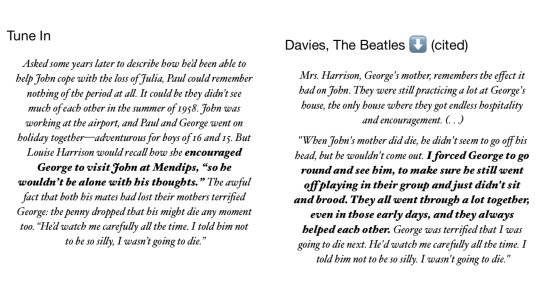
“It could be they didn’t see much of each other in the summer of 1958.”
In “A BEATLE DIDN’T SAY THAT!” one of my examples was Lewisohn very designedly making it seem like Paul wasn’t around for John after Julia’s death using a combination of an altered quote from George Harrison’s mother and the contextual phrasing surrounding it. Many know of Mrs. Harrison reassuring George that she wasn’t going to die, but Lewisohn cunningly alters the rest of her words and his supporting sentences to make Paul seem unaffected and distant after John’s mother’s death, and to paint George and Paul both as relatively unconcerned, when what Louise Harrison specifically says is that she sent George around to John’s to bring him over so that he could play guitar together with Paul and George, and that “they always helped each other.” For Lewisohn to surgically alter the words that he does quote, chop off the rest, and then sew them back up with misleading insinuations to create not only a false—but opposite—impression of the boys’ closeness after John’s loss is unforgivable.
TUNE IN – Lewisohn
Asked some years later to describe how he’d been able to help John cope with the loss of Julia, Paul could remember nothing of the period at all. It could be they didn’t see much of each other in the summer of 1958. John was working at the airport, and Paul and George went on holiday together—adventurous for boys of 16 and 17. But Louise Harrison would recall how she encouraged George to visit John at Mendips, “so he wouldn’t be alone with his thoughts.” The awful fact that both his mates had lost their mothers terrified George: the penny dropped that his might die any moment too. “He’d watch me carefully all the time. I told him not to be so silly, I wasn’t going to die.”
THE BEATLES – Davies (cited)
Mrs. Harrison, George’s mother, remembers the effect it had on John. They were still practicing a lot at George’s house, the only house where they got endless hospitality and encouragement. (…) “When John’s mother did die, he didn’t seem to go off his head, but he wouldn’t come out. I forced George to go round and see him, to make sure he still went off playing in their group and just didn’t sit and brood. They all went through a lot together, even in those early days, and they always helped each other. George was terrified that I was going to die next. He’d watch me carefully all the time. I told him not to be so silly. I wasn’t going to die.”
Lewisohn doesn’t outright say that Paul wasn’t around when Julia died, but he strongly infers it—deceptively altering and truncating a supposed-Mrs. Harrison quote—turning George's mom talking about how close the three were at that time and how they helped each other, into support for his inference that Paul barely saw John at this time. He then adds an introductory statement that makes it seem as if Paul was nowhere to be found, without actually saying that.
Yes, that's what I said. It is all lawyer-speak narration. Look at his first two sentences.
Asked some years later to describe how he’d been able to help John cope with the loss of Julia, Paul could remember nothing of the period at all.
It could be they didn’t see much of each other in the summer of 1958.
But we know the secret. We know what Mrs. Harrison actually said. And so does Mark Lewisohn, by the way.
Now, Lewisohn tells us that someone, somewhere, "some years later" asked Paul this "question" that I literally cannot even comfortably end with a question mark:
“Paul, describe how you were able to help John cope with the loss of Julia?”
Really?
I'm not going to lie, I don't believe him, but even if we give Lewisohn the benefit of the doubt— **excuse me i can't stop laughing. one sec**
—even if we give Lewisohn the benefit of the doubt that someone, somewhere, at some unnamed time, asked Paul to describe how he was able to help John cope with the loss of Julia, just what exactly would we expect Paul McCartney's answer to that to be? Honestly, try to imagine the look on Paul's face if he was asked to describe how he helped John to cope after Julia's death.
“Paul could remember nothing of the period at all.”
Did an appellate lawyer write this? No, this is contract law genius. I can find the holes in almost any contract, and Lewisohn's own words around a misused quote are a work of legal art. He never quite says what you think he said.
But on the quotes, themselves, Lewisohn swings for the fences. He is without shame or fear. He has no qualms about putting quotation marks around any old thing he wants to say. One cannot go too many pages without finding something that shocks the conscience.
These are not “mistakes.” They are a very deliberate cutting and pasting together of historical figures' words to make them mean something different—and often opposed to—what the speaker intended. He then surrounds the misquotes with carefully worded insinuations that don't really say what you thought they did.
THE ACTUAL MRS. HARRISON “QUOTE”
Davies is very good at weaving together information-heavy exposition together with the quotes from his interviews, and since he interviewed everyone himself, he can tell us a lot in his own words.
What that does for you and me is that we get the context from the guy who asked the questions and spent time with these people, and that makes it a lot harder to get away with using these quotes out of context. Like, before we even get to the direct quote from George's mom, Davies is telling us what she remembers from the time. And it's a lot. Because that's when the boys practiced at the Harrison's almost every day. And it's awesome because her memories almost always include what the boys were eating at the time. (Seriously.) Like, she'd “given them all beans and toast” a few months before Julia died when she heard John say to Paul, “I don't know how you can sit there and act normal with your mother dead. If anything like that happened to me, I'd go off me head.”
Davies also calls Mrs. Harrison “one of nature's ravers.” 🥹
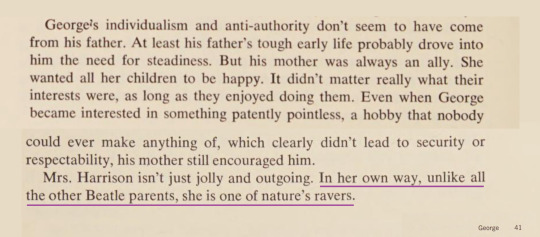
Everyone seems to agree that during this time the three were always at the Harrisons, and it's certainly the picture we get from Mrs. Harrison.
Davies is telling us all this, and leads into her direct quote by telling us what she “remembers.”
Mrs. Harrison, George’s mother, remembers the effect it had on John. They were still practicing a lot at George’s house, the only house where they got endless hospitality and encouragement.
And I trust Mrs. Harrison's memory because I am a mom, and I remember every trauma of my children's friends because I was the local Mrs. Harrison. We love those kids with all our hearts and they're so connected to our own kids that nothing happens to one without all of them feeling it. And the mom seeing it all. So how do we need Paul's answer to “Describe how you were able to help John cope with the loss of Julia?” when Mrs. Harrison has twenty stories, all with corresponding menus?
And Mrs. Harrison is saying that she sent George to get John out of his house so they could all play guitars together “in their group.” Not, George and John and no one knew where Paul was.
Where's Paul? Who could possibly know? “It could be they didn’t see much of each other”—but could it? It could be that Paul went ice skating in Sweden, EXCEPT HE FUCKING DIDN'T. Why are you lying to me in legalese in a Beatles biography?
“But Louise Harrison would recall how she encouraged George to visit John at Mendips” isn't true, but also isn't sane. If you pause and put as much thought into each sentence as was spent constructing them, you notice how many of them are patently ludicrous. Mrs. Harrison didn't encourage George to “visit” at Mendips because no child “visited” at Mendips. What are you even saying? To keep Paul and John away from each other you're talking nonsense. Visit? At Mendips? I can just picture John, Mimi and George sitting around having tea. But also, Mr. Lewisohn, those are not words that Mrs. Harrison said, and in fact, those words mean something completely different than the words she said.
What she said was she sent George over there “to make sure he still went off playing in their group and just didn’t sit and brood.”
And Nature's Raver Mom would see John not showing up like usual and would send her son out to make sure John knew he was wanted, and give him a little kick if necessary. She would want him in her house so she could feed him and make sure he was okay and to give him the comfort of playing music together with his friends.
They're the Beatles, and they got through it playing music. That's the real story, the true story, and a much better story.
And then she says “they all went through a lot together, even in those days, and they always helped each other.”
By cutting that out, leading into the quote you cut it from by speculating about where Paul was, and opining that maybe they didn't see each other much you are being purposefully deceptive and there simply is no other rational inference. None.
(I have tripled my website post now. I regret nothing.)
Let's take this baby home.
Because Mark Lewisohn completes the picture of John alone and ignored by George and Paul, and he does it by sneaking his own words into the mouth of George Harrison's dead mother.
I just want to make sure you got that. Like, let it sink in.
Mark Lewisohn changes Mrs. Harrison's actual words from “sit and brood” into “alone with his thoughts,” which further emphasizes the absolute absence of Paul and George. But he knows that John was not alone because he replaced Mrs. Harrison's words that said they were together playing music with his own words of John all alone. And then he has the nerve to even suggest that Paul and George are off together on holiday when John needs them most, while conjuring a parallel image of a traumatized John left separate and alone. (Except for his inner world.)
And I'm sorry, but I have to repeat it one more time: Lewisohn does all this by telling us that Louise Harrison said it. And although a lawyer could make a technical case that I am not being lied to here, I am.
Delusional Lewisohn is alive and well on my website. This has been Designing Lewisohn, signing off.
There's a lot, lot more and a lot, lot worse, but it's all of a piece. Not different in kind, just of degree. (But the degrees are significant.)
Tag 😏 @wingsoverlagos
#this got me DEEP in my maternal feelings last night#get a job/stay away from [louise harrison]#mark lewisohn#tune in#the beatles#lewi-sins
29 notes
·
View notes
